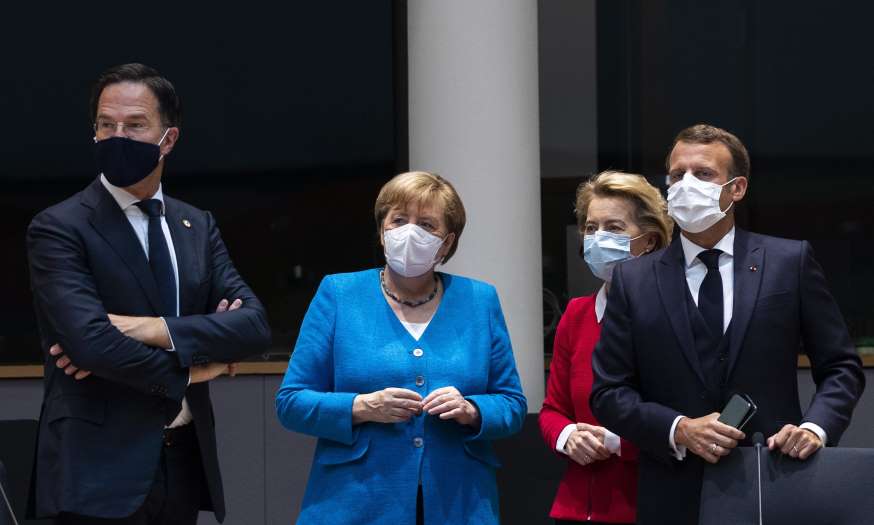Bad-tempered, late-running EU summits have hardly been unusual over the last decade of eurozone crisis and endless fights over migration. But the latest three-day gathering of EU leaders, with a €1.8tn (£1.6tn) financial plan at stake, may be one of the most acrimonious yet.
Read Also: Coronavirus Hits Bolivia, President Anez, 7 Ministers Test Positive
After a friendly start, where EU leaders exchanged playful elbow bumps and birthday greetings, the temperature plummeted. Dinner on the first evening was “a bit surly” according to Dutch prime minister, Mark Rutte, after other leaders rounded on him over his insistence on being able to veto others’ access to a €750bn coronavirus recovery fund, if their economic reforms were deemed inadequate. Bulgaria’s prime minister, Boyko Borissov, accused Rutte of wanting to be “the police of Europe”, while Poland’s leader, Mateusz Morawiecki, called Rutte and his “frugal” north European allies “misers”.
The second big fight was over the size of recovery fund grants: a proposed €500bn in grants for the hardest hit countries was shaved down to €450bn. But that was still too much for the frugal club of the Netherlands, Austria, Denmark, Sweden, and the unofficial member, Finland.
After a second day of deadlock, Angela Merkel and Emmanuel Macron walked out of midnight talks with the frugals – a display of unity by the Franco-German pair, who first proposed a massive recovery fund underpinned by taboo-breaking EU borrowing on financial markets to pull the EU out of the worst recession in its history.
“They ran off in a bad mood,” Rutte complained. “We are ready to compromise without giving up ambition,” said Macron.
The third battleground also put the Dutch in the firing line, as Hungary’s prime minister, Viktor Orbán, compared Rutte to the communist police. The Netherlands, along with many EU governments, wants to tie European funds to upholding democratic values – a plan staunchly opposed by Hungary and Poland, both subject to EU investigations on the rule of law.
The communist police used “unclarified legal terms, exactly the same which is written in the proposal of the Dutchman,” said Orbán recalling his own encounters with state police as a young activist.
Orbán’s chief spokesman tweeted that “only Hungarians should get to decide how to spend the money that belongs to [Hungary]” – a stance that is likely to raise hackles, as Hungary receives six times more from the EU than it pays in.
By Sunday, however, some EU diplomats thought western Europe’s united stance on the rule of law was beginning to fragment. “It’s a bargaining chip,” said one EU diplomat. The frugals give the impression “we might settle for less rule of law, if you agree to the overall recovery plan,” the diplomat said.
As a third day drew to a close, agreement on the €1.8tn deal (the EU’s next seven-year budget and recovery plan) was still hanging in the balance. Some EU sources are already pencilling in a rematch summit in late July or late August – the latter seen as providing more breathing space for countries to rethink their red lines.
Failure to agree will weigh heavily on the EU. The hardest-hit countries already have access to a €540bn financial cushion, but France, Germany, Italy and Spain see this as inadequate to the scale of the looming recession.
Leaving Brussels empty-handed would also be a damaging political blow, tarnishing the EU’s prestige and raising questions about its ability to act in a crisis. It would also undermine the newish leaders of the EU institutions, European commission president Ursula von der Leyen, the architect of the recovery plan, as well the European Council president, Charles Michel, the main deal broker.
Even with a deal, this bitter summit has exposed poisonous mistrust between some leaders, as well as the EU’s struggle to deal with nationalists in central Europe, who are feared to be trampling on Europe’s basic values. A few bad-tempered days in Brussels may leave political scars.
MSN

